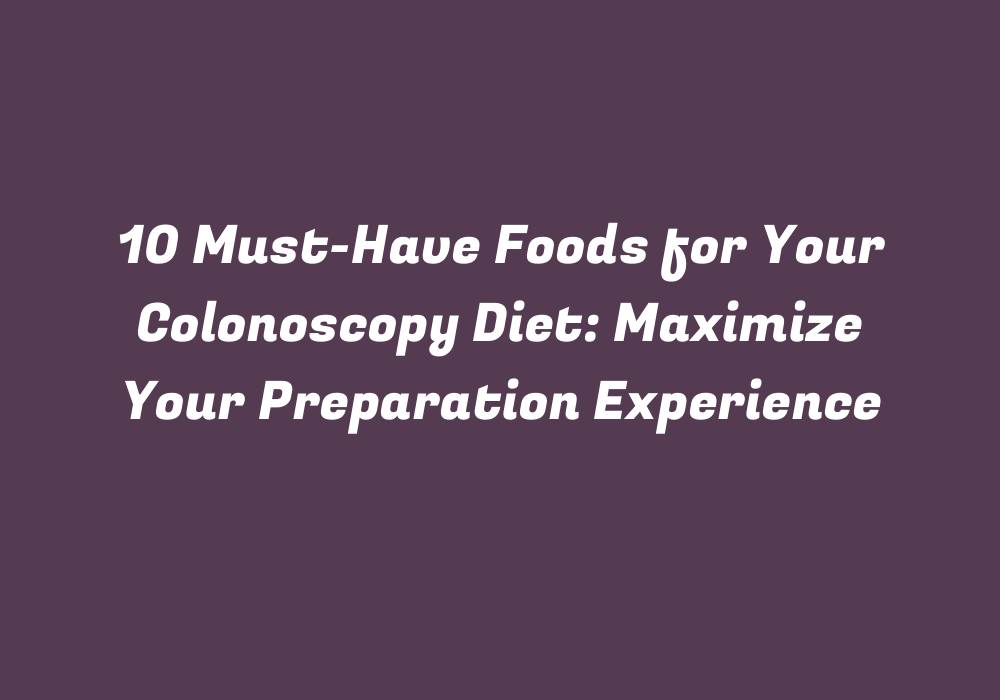Introduction to Colonoscopy Diet and Its Importance
A colonoscopy is a routine medical procedure that aims at assessing the health of your large intestine. It is vital for early detection and treatment of potential issues, such as polyps or inflammation. In preparation for this examination, your doctor will likely recommend adopting a specific diet known as the “colonoscopy diet.” This tailored diet is designed to help cleanse your colon to ensure optimal visibility during the procedure while also providing essential nutrients to keep you healthy and energized.
In this article, we will explore the top 10 must-have foods that should be incorporated into your colonoscopy preparation diet. By including these nutrient-dense options in your meal plan, you can maximize the effectiveness of your colonoscopy experience and boost your overall wellbeing during this important medical journey.
1. High Fiber Foods: The Foundation for a Healthy Digestive System
Fiber plays a significant role in promoting regular bowel movements, which is crucial to your colon’s optimal functioning and the success of the colonoscopy procedure. During this time, it is essential to consume fiber-rich foods that aid in softening stool consistency while simultaneously maintaining healthy digestion. Incorporate these high-fiber options into your daily meal plans:
Oats
Start your day right with a bowl of oatmeal, which is packed with soluble and insoluble fiber to keep you feeling full and promote regularity. Oats are also low in sugar, making them an ideal choice for maintaining stable blood glucose levels before the colonoscopy.
Fruits
Enjoy a variety of fruits throughout your day. Fiber-rich options include apples, pears, oranges, berries, and bananas. These fruits are also rich in vitamins, minerals, and antioxidants that support overall health.
Vegetables
Incorporate leafy greens, such as spinach, kale, or chard into your meals. Additionally, opt for other fiber-dense veggies like broccoli, cauliflower, and Brussels sprouts to support your digestion and promote a healthy colonoscopy preparation diet.
2. Hydration: The Key to Colon Cleansing
Staying well-hydrated is crucial during the days leading up to your colonoscopy. Adequate water intake ensures that your body can efficiently eliminate waste and toxins, thus enhancing the visualization of your large intestine for the doctor. Consume at least 8 glasses (approximately 2 liters) of water daily in addition to drinking clear liquids, such as herbal tea, fruit-infused water, or low-sugar sports drinks, to support your body’s detoxification process and maintain a healthy bowel function.
3. Lean Protein: Nourishing Your Body While Preparing for the Procedure
Although protein intake should be minimized during the last few days before your colonoscopy, it is essential to maintain some lean sources of protein in your diet. Opt for low-fat dairy products like Greek yogurt and low-fat milk, lean meats such as chicken or fish, and plant-based alternatives like tofu or tempeh. These protein options provide the necessary amino acids that support muscle function while ensuring you receive essential vitamins and minerals without adding excess fat to your diet.
4. Low-fat Foods: Maintaining a Balanced Diet
Keeping your fat intake low during colonoscopy preparation is important for optimizing the visualization of your large intestine. Avoid high-fat foods like fried dishes, red meat, and full-fat dairy products. Instead, choose healthier alternatives such as olive oil, avocado, and nuts in moderation to provide essential healthy fats while maintaining a balanced diet.
5. Complex Carbohydrates: Energy for Your Body
Complex carbohydrates are an excellent source of energy during this time as they slowly release glucose into the bloodstream, preventing sudden spikes in blood sugar levels that may affect your colonoscopy experience. Incorporate whole-grain bread, brown rice, quinoa, sweet potatoes, and whole wheat pasta into your meals to maintain stable energy levels throughout the day while ensuring a smooth transition through your procedure.
6. Limit Sugar Intake: Stabilize Blood Glucose Levels
High blood glucose levels can lead to dehydration and constipation, both of which are undesirable outcomes during the days leading up to a colonoscopy. Avoid sugar-laden processed foods, baked goods, candy, and sugary beverages in favor of naturally sweet fruits or whole grains for a gentler approach to maintaining balanced blood glucose levels.
7. Avoid Irritating Foods: Prevent Unnecessary Discomfort
During your colonoscopy preparation period, it is crucial to eliminate foods that may irritate the gastrointestinal tract and potentially interfere with the effectiveness of the procedure. Minimize the consumption of spicy dishes, caffeine, alcohol, and acidic fruits like citrus and pineapple to ensure a comfortable experience throughout your colonoscopy journey.
8. Focus on Flavor: Spice up Your Meals
While some seasonings may be off-limits during this time, there are still many flavorful options that can help maintain an enjoyable eating experience while promoting overall health and wellbeing. Experiment with using herbs like parsley, cilantro, or basil in your dishes, or try adding fresh lemon juice for a touch of citrus without the potential stomach irritation.
9. Adhere to Clear Liquid Diet: Enhance Visibility During the Procedure
In the final days leading up to your colonoscopy, it is essential to adhere strictly to a clear liquid diet to maximize your preparation experience and optimize visualization during the procedure. Consume only clear liquids like water, sports drinks, broth-based soups, fruit juice, tea, jelly, and gelatin for optimal results.
10. Remember to Follow Doctor’s Instructions: Prioritize Safety
Remember that every individual’s needs may vary during their colonoscopy preparation journey. Always consult with your doctor or healthcare provider about which foods and beverages are best for your specific situation, ensuring a successful and comfortable experience throughout this important medical procedure.
